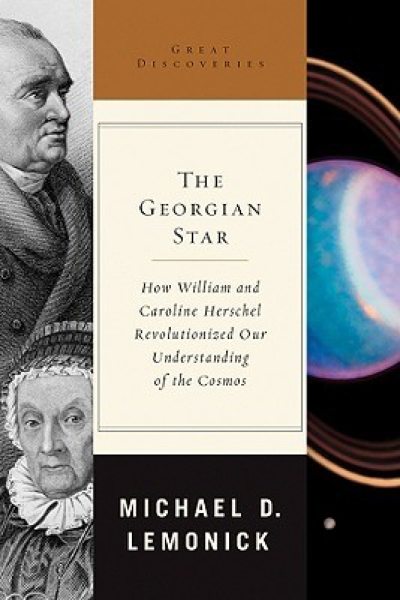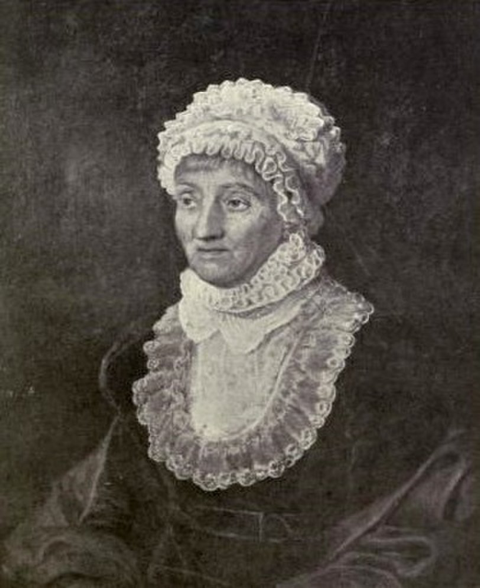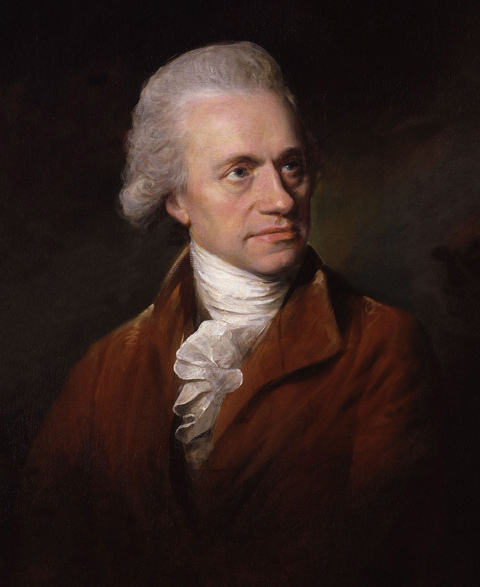The Georgian Star
By Michael D. Lemonick
W. W. Norton & Co.
2009, 199 pages
Reviewed by Todd Stelling
Endicott College
April 2018

If you have never heard of the Herschels, then you are missing out on the most
important astronomers of the 18 th and 19 th Century. William Herschel, discoverer of Uranus,
together with his able and dedicated sister Caroline and his erudite son John revealed the Milky
Way and its diverse contents as never before. Through careful visual observations with their
giant telescopes, this dynastic dynamo bore witness to a multitude of dancing double stars,
incandescent nebulae, and the Milky Way itself. Today, we inherit from them the picture of a
disk-like galaxy which contains our Solar System and countless other stellar systems.
How did William and Caroline Herschel revolutionize our understanding of the cosmos?
This is the question that the book The Georgian Star sought to answer. The author of this book is
Michael D. Lemonick, who had previously written books such as Echo of the Big Bang and The
Light at the Edge of the Universe. Lemonick currently teaches at Princeton, Columbia, and the
John Hopkins Universities, but he formerly was a senior science writer for Time and senior staff
writer for Climate Central. He wrote several astronomical books before and during his teaching
tenure, with some of them mentioned beforehand. Taking into consideration Lemonick’s
background in science writing and especially his writing of astronomical books, he is well-
qualified to write on this important topic in astronomy.
Lemonick is by no means an expert on the Herschels, but that did not hinder his ability to
construct an informative, yet engaging narrative on one of the most, if not the most, important
families in astronomy. As Neil DeGrasse Tyson states on the back of the book, “In The Georgian
Star, Michael Lemonick tells the compelling story of the eighteenth-century English siblings
William and Caroline Herschel, who, wielding the largest telescopes of their day, transformed
astronomy into a modern science.” Michael Lemonick does just this by telling the story of an
overlooked family that means so much to modern astronomy.
The Georgian Star is organized mainly in chronological order, starting with William Herschel’s great-grandfather, Hans, and ending with Caroline Herschel’s death on January 9, Before the story of William and Caroline’s life, the reader is given a taste of what William
Herschel is most known for. The book starts with an account of William’s discovery of an
unknown object that he found while doing his normal sweep of the night sky. Upon further
examination with his telescope, William still could not quite place his finger on what it could be.
He thought it may be a comet, but the unknown object did not have many similarities with a comet. After asking fellow astronomers to search for this object, they all deduced that William
Herschel had just discovered a new planet. This is an incredibly impressive feat, especially
considering the life that the Herschel family lived preceding this incredible discovery. The book
now rewinds and goes through what the life of a Herschel was like before their commitment to
astronomy, and then goes on to describe their lives after astronomy had become their sole
occupation.
Isaac Herschel was the father of William, Caroline, and the eight other Herschel
offspring. Hans Herschel, William and Caroline’s great-great-grandfather, and Abraham, their
grandfather were far from being astronomically inclined. Hans was a brewer, while Abraham
was a gardener. Isaac, their father, was drastically different from his elders. After failing in his
father’s trade of gardening, Isaac switched to music. The whole Herschel bloodline hailed from
Hanover, a state which is now part of Germany. After taking a while to get on his feet as a
musician, he was able to gain a position in the regimental band of the Foot Guards in Hanover’s
army. Eventually, Isaac had ten children, with six of whom survived their childhood. William,
Sophia, Jacob, Alexander, Dietrich, and Caroline were those survivors.
Isaac had a large influence on their lives, especially William. Isaac introduced William to
the world of music. William was a very talented musician since he was able to play multiple
instruments. After visiting many places and playing music wherever he went, William ended up
in the regimental band of the Foot Guards with his father. Music wasn’t enough for William,
however. He was an ambitious young man at this point, taking up interest in mathematics and
science, and yes, even a little bit of astronomy. Then, war struck. Hanover was no longer fit for
an aspiring musician. With the instructions of his father, William fled to England, where he lived
out the rest of his life.
For several years, William searched for the right place in England, somewhere where he
could have a fruitful career. During this time, William moved up in the ranks of the musical
world, where he was making a name for himself. Even though none of his work is typically
played now, William was a truly good musician. As his stature in the musical world was gaining,
his interest in astronomy was also growing. With this growth in astronomical interest, William
realized that he needed a telescope. William would not buy one, however. Instead, he intended to
build his own. With the help of his brother Alexander, they began to learn and construct different
designs of telescopes. In the end, the best telescope, and the one William used for most of his
discoveries, was the 20-foot telescope that the brothers constructed. This telescope helped
William Herschel skyrocket into the astronomical scene.

telescope builder, but none of them were as capable as this 20-foot telescope. It was with
this telescope that William made most of his discoveries, including the discovery of
Uranus.
At this point, William asked for Caroline to be sent to England. With Caroline now in
England with William, astronomy was about to witness a dramatic increase in discoveries. The
most famous discovery is that of Uranus, the eighth known planet at the time. The discovery of
Uranus was an incredible feat for a person who had studied astronomy, let alone William, who
was a self-taught astronomer. William went on to extensively study double stars, stars in actual
binary systems, and nebulae. William also started manufacturing telescopes. The discovery of
Uranus, however, was by far William’s most important achievement. Caroline Herschel was just
as important as William because she organized all of the data that he dictated to her while
observing the night sky. Caroline made several discoveries of her own, including several comets
and a fair share of nebulae. Caroline even arranged all of the nebulae into an index so that
William’s son, John, could further his studies in astronomy and carry on the Herschel legacy.
This index organized over 2,500 nebulae that were discovered during her time.
William’s discovery of Uranus allowed for all of his success, mainly because of the fact
that it made him universally recognized. Originally, William named Uranus the Georgian Star,
after King George III of England. The name did not stick, but King George III certainly enjoyed
the naming. King George III allowed for William to work for him as an astronomical
“entertainer”. William received generous funding, and all he had to do was let royal guests
examine celestial objects through his telescope.
Not all of his work was successful, though. William eventually constructed a 40-foot
telescope, which was supposed to revolutionize the way telescopes were made. However, the
telescope never lived up the hype. The behemoth was so large that it required two workers to
help William maneuver it. These maneuvers were slow and wasted time, something that an
established astronomer like William hated. William’s astronomical interest eventually slowed
down when he married. He began to travel more, not living his life through a telescope. This
allowed for Caroline to take over and make her discoveries. Unfortunately, William’s lessened
astronomical interest because of marriage led to an estrangement between Caroline and William.
The damage never repaired itself before William’s eventual death on August 25, 1822, with
Caroline dying in 1848. William left behind a son, John, who carried on his father’s astronomical
legacy. John went on to to scour the night sky from the Southern Hemisphere, making some
discoveries of his own along the way. Eventually, John merged his discoveries with his father’s
and published the General Catalogue of Nebulae and Clusters of Stars.
Michael Lemonick’s The Georgian Star is a biography of the Herschel family and their
greatest discoveries, which were mainly done by William and Caroline Herschel. The tone
throughout this biography is informative. This seems somewhat obvious due to the nature of the
book. Outer space has so much information; information which William sought to understand.
Therefore, it makes sense that the tone throughout the passage was so descriptive. Whether the
story was talking about William’s marriage or Caroline’s discovery of different comets,
Lemonick stayed on this path. Lemonick also described certain astronomical processes, such as
trigonometric parallax or how a telescope, like those built by William, was constructed. Even
though these descriptions weren’t absolutely necessary for the understanding of the Herschels’
discoveries, they were still added for informative purposes. Lemonick wanted to not only convey
to the reader the Herschels’ cosmic discoveries, but also how these discoveries were made.
Michael Lemonick is well versed in the art of writing a book pertaining to astronomy. He
has several other astronomical books published, such as Echo of the Big Bang and The Light at
the Edge of the Universe. Due to these other astronomical titles that he has written, The Georgian
Star was influenced by Lemonick’s previous works. The writing throughout The Georgian Star
is of good quality. It was reassuring for me to see that the author of this book, a book that has a
somewhat complex subject, knew what he was talking about.
The writing of the book wasn’t the only thing that impressed me about the book. What
impressed me most was the subject of the book: William and Caroline Herschel. What they went
through is basically like a current-day rags-to-riches story. The fact that William and Caroline
Herschel would end up in such high regard within the astronomical field is amazing. They were
not poor in youth, but they had to work hard to get where they were in the end. William had to
flee a wartorn Hanover to achieve his success, while Caroline had to wait patiently in Hanover
for her chance to show her brilliance. The most amazing thing of all, to me, was that the
Herschels were such great musicians, and that their work in astronomy was almost completely
self-taught. William was a successful musician in England, and Caroline became a great singer
with the help of William. The fact that these two siblings were great at both music and
astronomy was mind boggling to me. William’s telescopes were of incredible quality, something
that his brother and he were able to construct themselves. William’s stature had grown so much
that he gained recognition from King George III of England and even met Napoleon Bonaparte.
William and Caroline put so much of their lives into astronomy, something that had helped put
modern astronomy on the map. This in itself is incredibly impressive.
If someone is looking for a story of historical importance when it comes to astronomy,
this is the book for them. The book ably showcases a brother and sister team that helped to map
the night sky and formulate much of what we understand today about the unknown that is outer
space. The book is well written, very informative, and can hold your interest. Before reading The
Georgian Star, I had never heard the surname Herschel. Herschel had never come up in my high
school tenure, which is quite bothersome in retrospect. This book helps to bring to light the lives
and discoveries of two incredibly important people in our current astronomical understanding.
More people need to learn about this underappreciated duo. The Georgian Star has brought me to believe that the Herschels deserve a
spot right next to the best of them: Nicolaus Copernicus, Galileo Galilei, Tycho Brahe and
Johannes Kepler… William and Caroline Herschel.
Works Cited
Lemonick, Michael. The Georgian Star / How William and Caroline Herschel Revolutionized
Our Understanding of the Cosmos. New York, New York, W.W. Norton & Company,
2009.
Pictures:
https://www.space.com/17439-caroline-herschel.html
https://en.wikipedia.org/wiki/William_Herschel
https://airandspace.si.edu/exhibitions/explore-the-universe/online/etu_a_herschel.htm
Todd Stelling is a student at Endicott College in Beverly, MA majoring in environmental
science.


